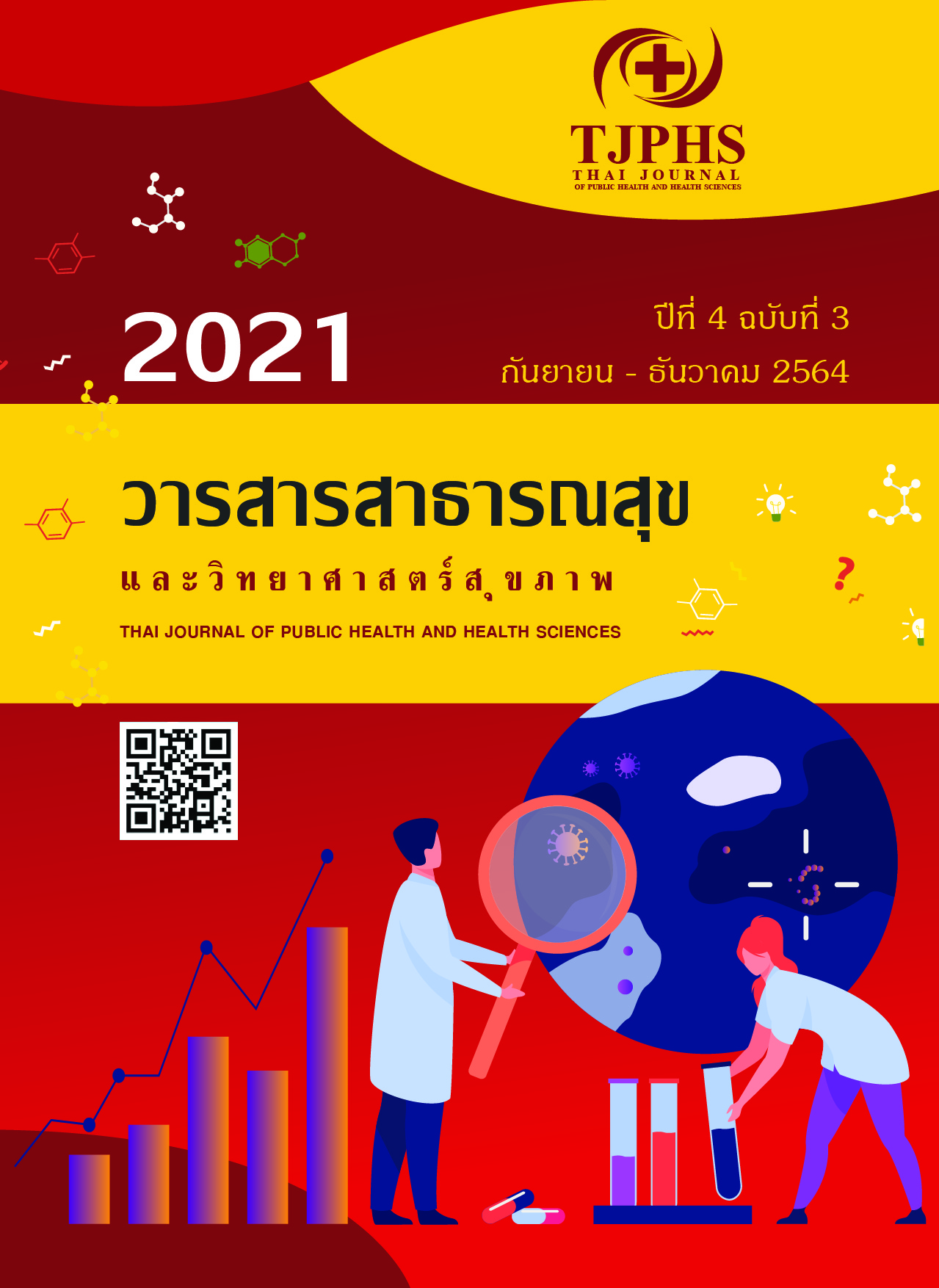บทบาทพยาบาลในการส่งเสริมความสามารถในการดูแลผู้ป่วยโรคจิตเภทเพื่อลดการรับรู้ตราบาป
คำสำคัญ:
บทบาทพยาบาล, ตราบาปของผู้ป่วยโรคจิตเภท, การดูแลผู้ป่วยโรคจิตเภทบทคัดย่อ
โรคจิตเภท จัดว่าเป็นปัญหาสำคัญที่พบได้บ่อยเป็นอันดับหนึ่งและเป็นโรคจิตเวชที่มีความรุนแรง เนื่องจากผู้ป่วยโรคนี้ส่วนใหญ่มักมีการดำเนินโรคที่เรื้อรังและกำเริบ (relapse) ได้บ่อย เมื่อเป็นแล้วมักไม่หายขาด ส่วนใหญ่มีอาการกำเริบเป็นช่วงๆ และอุบัติการณ์ของโรคพบได้ประมาณร้อยละ 2.5-5 ต่อประชากร 1,000 คนต่อปีของประชากรทั่วโลก ในประเทศไทยพบว่าอัตราการป่วยด้วยโรคจิตเภท ร้อยละ 24.19 ของผู้ป่วยทางจิตเวชทั้งหมด จึงอาจนับได้ว่าโรคจิตเภทเป็นปัญหาทางสาธารณสุขที่สำคัญอีกโรคหนึ่งของประเทศและเป็นสาเหตุของการฆ่าตัวตายทำให้อายุขัยลดลง 10 ปีด้วย ตราบาปที่เกิดกับผู้ป่วยจิตเวชเป็นปัญหาที่พบได้ทั่วโลก ไม่ได้เกิดเฉพาะประเทศในแถบเอเชีย แปซิฟิกเท่านั้น โรคทางจิตเวชที่ได้รับผลกระทบจากตราบาปมากและรุนแรงที่สุดได้แก่ โรค จิตเภท
การถูกตีตราหรือตราบาป จะทำให้ผู้ป่วยเกิดความตึงเครียด (tension) รู้สึกว่าตนไม่เป็นที่ยอมรับของสังคม บุคคลต้องดิ้นรนต่อสู้กับทัศนคติที่ไม่ดี และลดคุณค่าของตนเองลงพัฒนากลวิธีในการจัดการกับการตีตรา บุคคลที่ล้มเหลวก็ไม่สามารถทำสิ่งต่างๆ ได้อย่างเพียงพอเป็นสาเหตุทำให้บุคคลรู้สึกถูกทอดทิ้ง ถอยหนีจากการมีปฏิสัมพันธ์กับสังคม โกรธแค้นบุคคลอื่น และเกิดการตีตรายังทำให้บุคคลไม่บรรลุความต้องการพื้นฐานในด้านความรัก ความเป็นเจ้าของ การนับถือตนเอง ความปลอดภัย ความมั่นคง และอำนาจ ในแง่ของการเจ็บป่วย การตีตราจะลดความสามารถในการปรับตัวต่อความเจ็บป่วยในระยะเฉียบพลัน และการปรับตัวระยะยาวเรื้อรัง
ฉะนั้นบทบาทพยาบาลในการส่งเสริมความสามารถในการดูแลผู้ป่วยโรคจิตเภท เพื่อลดการรับรู้ตราบาป ต้องมีบทบาทหน้าที่แทนในการให้ข้อมูลเกี่ยวกับการเจ็บป่วยทางจิตกับบุคคลในการส่งเสริมให้ผู้ป่วยเผชิญหน้าอย่างท้าทายกับตราบาป การส่งเสริมให้ผู้ป่วยเข้ากลุ่มกับคนที่เข้าใจและยอมรับตนเอง การส่งเสริมให้ผู้ป่วยคิดเชิงบวก ส่งเสริมการสนับสนุนทางสังคมให้กับผู้ป่วย และการเสริมสร้างพลังอำนาจและการเพิ่มปฏิสัมพันธ์ทางสังคมให้กับผู้ป่วย เพื่อเป็นการส่งเสริม สนับสนุน และพัฒนาให้ผู้ป่วยเกิดความสามารถในการจัดการกับตราบาปที่เกิดขึ้นอย่างเหมาะสม และพัฒนาความสามารถในการปรับตัวต่อความเจ็บป่วย ส่งผลต่อคุณภาพชีวิตของผู้ป่วยจิตเภทให้ดีขึ้น
เอกสารอ้างอิง
Agrasuta, T., and Pitanupong, J.(2016). Perceived stigma in patients with schizophrenia and caregivers in Songklanagarind hospital: cross-sectional study. Songklanagarind Medical Journal, 35(1), 37-45. (in Thai)
Deepet, S. and Dangdomyouth, P.(2015). The Effect of Using Empowerment Program on Self-Stigma
of Persons with Schizophrenia in Community. Journal of Psychiatric Nursing and Mental Health, 29(1), 123-138. (in Thai)
Dickerson, FB. Sommerville, J. Origoni, AE. Ringel, NB. and Parente, F. (2002). Experiences of stigma among outpatients with schizophrenia. Schizophr Bull, 28,143-155.
Goffman E.(1963). Stigma: Note on the management of spoiled identity. Erglewood Cliffs. NJ: Prentice-Hall.
Holzinger, A., Beck, M., Munk, I., Weithaas, S., and Agermeyer, M. C. (2003). Stigma perceived by schizophrenia and depressives. Psychiatrische Praxis, 30(7), 395-401.
Hopper,E..(1981). Stigma impact on Moroccan families of patients with schizophrenia. Canadian Journal of Psychiatry, 49 (9), 625
Intararuk, P.(2006). Experience of self management toward negative social perception of schizophrenic patients in community. Thesis of the Degree of Master of Nursing Science Program in Mental Health and Psychiatri Nursing. Chulalongkorn University. (in Thai)
Jnmpasri, W. and Dangdomyouth, P.(2012). The Effect of Using Group Supportive Psychotherapy on
Perceived Stigma of Schizophrenic Patients. Journal of Psychiatric Nursing and Mental Health,26(2), 51-62. (in Thai)
Kadri N, Manoudi F, Berrada S, Moussaoui D.(2004). Stigma impact on Moroccan families of patients
with Schizophrenia. Canadian J Psychiat,49(9), 625–629.
Kerdpongbunchote, C., Kuntasaibour, P., and Suparochanee, S. (2015). Prototype development: empowerment program on internalized stigma for schizophrenic inpatients. Journal of Mental Health of Thailand.23(1), 38-48. (in Thai)
Kittirattanapaibul P. Psychiatrics for lay persons. (2006). (Accessed on May 10, 2012,
http://www.d Lortrakul M, mh.go.th/news/view.asp?id=100.
Lotrakul,M and Sukanich, P. (2015). Ramathibodi Essential Psychiatry. 4nd ed. Department of Psychiatry Faculty of Medicine Ramathibodi Hospital. (in Thai)
Lysaker, PH. Tsai, J. and Vohs,JL.(2010).Negative symptoms and concomitantattention deficits in schizophrenia: Associations with prospective assessments of anxiety, social dysfunction, and avoidant coping. Journal of Mental Health,19(2),184–192.
MacInnes, D. L., and Lewis, M. (2008). The evaluation of a short group programme to reduce self‐stigma in people with serious and enduring mental health.
Mekloi, C. (2020). Stigma of Suicide Survivors and Application of Group Supportive Psychotherapy. Journal of Mental Health of Thailand, 34(2), 18-32. (in Thai)
Pookaew P., Chaisena Dallas, J., and Nabkasorn, C. (2019). Effect of Art Therapy Group on Self-esteem among Patients with Schizophrenia. Journal of Phrapokklao Nursing College, 30(2),123-133. (in Thai)
Pumput, P. (2016). self management toward negative social perception of schizophrenic patients.
Department of Mental and Psychiatric Nursing. Boromarajonani College of Nursing Suratthani. (in Thai)
Razali SM, Hussein S, Alina TI. (2010). Perceived stigma and self-esteem among patients with schizophrenia. Inter Med J.17(4):255-260.
Switaj P, Wciórka J, Grygiel P, Switaj JS, Anczewska M, Grzesik A.(2011). Experience of stigma by people with Schizophrenia compared with people with depression or malignancies. Psychiatrist (Online).35,135-139.
Tongprateep,T. (1998). The essential elements of spirituality among rural Thai elders. Unpublished
doctoral dissertation, University of Albama at Birmingham.
Tungpunkom, P. (2008). Quality of life of person with Schizophrenia : patient's and caregiver's perspectives. Faculty of Nursing. Chiang Mai University. Journal of Psychiatric and Mental Health Nursing, 15(1), 59-65. (in Thai)
Wahl, O. F. (1999). Mental health consumer’s experience of stigma. Schizophrenia Bulletin,25(3), 467-478.
Wannachat, O. (2016). Life skills as perceived by caregivers, social support and perceived stigma among persons with schizophrenia. Thesis of the Degree of Master of Nursing Science Program in Mental Health and Psychiatric Nursing. Chiang Mai University. (in Thai)
Wootiluk, P. (2019). Nursing Care of patients schizophrenia : Role and Process. 2nded. Faculty of
Nursing. Chiang Mai University. (in Thai)
Worasing, S, Hengudomsup, P. and Naebkaset, C.( 2014). Factors Related to Perceived Stigma among Patients with Schizophrenia. Thai Pharmaceutical and Health Science Journal,9(3),98-104. (in Thai)
ดาวน์โหลด
เผยแพร่แล้ว
รูปแบบการอ้างอิง
ฉบับ
ประเภทบทความ
สัญญาอนุญาต
ลิขสิทธิ์ (c) 2021 วารสารสาธารณสุขและวิทยาศาสตร์สุขภาพ

อนุญาตภายใต้เงื่อนไข Creative Commons Attribution-NonCommercial-NoDerivatives 4.0 International License.
บทความทุกบทความที่ได้รับการตีพิมพ์ถือเป็นลิขสิทธิ์ของ วารสารสาธารณสุข
















